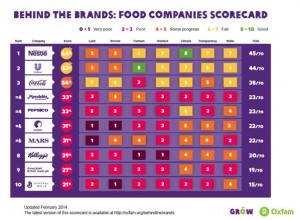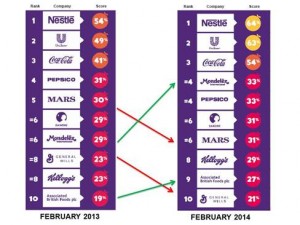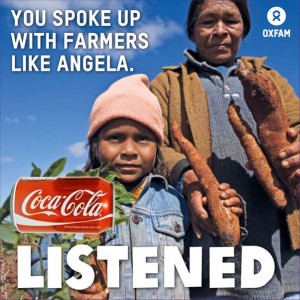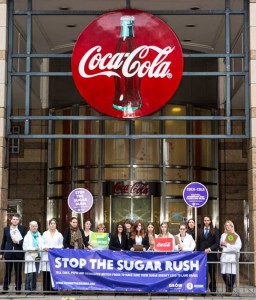This post was contributed by Erinch Sahan, private sector policy advisor at Oxfam GB. Erinch leads Oxfam’s work on scoring the food and beverage companies for the Behind the Brands campaign.
A year ago, we at Oxfam launched our scorecard that assesses the policies of the world’s 10 largest food and drinks companies (‘the Big 10’). With a focus on the rights of workers, farmers and communities in their supply chains, we scored companies on seven key themes that impact the most vulnerable people they impact: workers, farmers, women, land, climate, water and transparency.
The process has been a long one. In coming up with the indicators a year ago, we worked with industry experts and consulted the companies and civil society. The over-arching questions we ask of the companies remain:
- Do you proactively try to uncover, track and disclose human rights and other social and environmental risks in your supply chain?
- Do you make commitments to address these issues?
- Do you require your suppliers to address these issues?
Our scorecard only considers publicly available information, because transparency is a key aspect of corporate accountability. We also disclose our indicators, assessments and references on our website, to live up to the same standard of transparency. A year on, here’s how the companies are doing.
Most are improving
The companies are on the right track. All but General Mills have improved their overall scores since February 2013. The top three (Nestle, Unilever and Coca-Cola) separated themselves further from the pack, with Nestle’s performance on climate (which includes both mitigation and adaptation) and Unilever’s performance on farmers the two highest scores.
No longer ignoring land and women’s rights and improvements on climate
A year ago, it was clear that the industry was failing on two key issues: how it addresses women’s inequality and land rights. Scores were woeful and none of the Big 10 had an approach that addressed the plight of women working on farms around the world and none were making suppliers respect the rights of communities over land.
In response, we spent the last year reminding companies about these blind-spots, asking supporters (nearly 400,000 supporters spoke up), investors (representing billions of dollars asked the companies to act) and civil society to join us in urging the Big 10 to start addressing gender and land issues.
The results are encouraging. Led by Coca Cola, six of the Big 10 now endorse the principle of Free, Prior and Informed Consent on land acquisition. This is key in ensuring communities have a say over what happens to the land they depend upon. Seven of the Big 10 have signed on to the UN Women’s Empowerment Principles, which demonstrates a commitment to ensuring the industry starts addressing the barriers faced by women on farms and markets around the world. Similarly on climate, companies have started putting in place targets to reduce emissions and start disclosing more about their carbon footprint.
Too many issues remain unaddressed
While we saw impressive improvements on women’s rights, land and climate change, we didn’t see the same level of movement in the workers, farmers and water themes. On these themes, (apart from Coca Cola on water), no company showed significant improvements.
On water and workers issues, companies had already picked off the ‘low hanging fruit’ and taken some steps to strenghten their committmens. For instance, a year ago, most companies had already recognised the International Labor Organization’s labour rights conventions and were disclosing key water information through the Climate Disclosure Program’s Water Program. But a year later, still only PepsiCo recognises the UN Human Right to Water and no company has set a specific target to reduce its water use along its whole supply chain. On farmers, only four companies (Danone, General Mills, Nestle and Unilever) mildly improved their performance over the course of the year. Most continue to ignore the importance of ensuring dealings with farmers are fair and inclusive (e.g. through transparent contracts and ensuring farmers are paid fairly).
What are they hiding?
The industry has started to disclose a little more about their agricultural sourcing, but many still shy away from revealing who they buy from. Allowing consumers, the public and communities to work out which producers connect to which global brands is key for accountability. Though the Big 10 are by-and-large preventing this.
The updated scorecard now also assesses a critical new component of transparency – taxes – focusing on whether companies disclose information linked to the use of tax havens. New indicators on transparency now ensure that we better capture this important theme. People and corporations using tax havens are depriving the world of more than $150 billion in lost revenue, enough money to end extreme poverty twice over. Through our new tax indicators Oxfam aims to identify which companies are most open and accountable in their tax dealings. With the exception of Unilever and Coca-Cola, all the companies fail miserably in tax disclosure.
What next?
We’ll continue to score the companies on these issues, highlighting where they improve and drawing attention to where they don’t. We’ll also keep talking to supporters, investors, civil society and governments to get others to also deliver the message on fair and sustainable agriculture to the Big 10.
If companies are to show leadership on these issues (and see their scores improve), they have to start taking some of the tougher steps, including ensuring they pay the prices for their commodities that allow for sustainable production on farms and truly open up to scrutiny by disclosing more about who they do business with and the issues they are uncovering. This needs to be accompanied by giving marginalised people a real voice in decisions. Whether it’s workers having a say in their working conditions through collective bargaining, farmers able to control their destiny through producer organisations or women able to raise concerns via women’s organisations, there are many ways the ‘Big 10’ can use their immense power to give people with little power a real voice. Policies and commitments are a good start but a step-change is needed to bring rights and voice for all to the centre of their business model.
Erinch Sahan
Erin ch Sahan is a private sector policy advisor focused on agricultural markets. Erinch leads Oxfam’s work on scoring the food and beverage companies for the Behind the Brands campaign. Alongside his work on Oxfam’s campaigns, Erinch works with companies on understanding their impacts on poverty and developing new business models, particularly around agricultural sourcing.
ch Sahan is a private sector policy advisor focused on agricultural markets. Erinch leads Oxfam’s work on scoring the food and beverage companies for the Behind the Brands campaign. Alongside his work on Oxfam’s campaigns, Erinch works with companies on understanding their impacts on poverty and developing new business models, particularly around agricultural sourcing.






